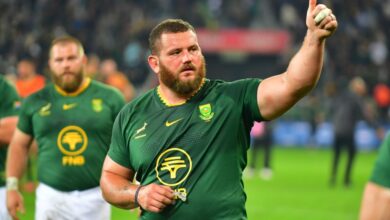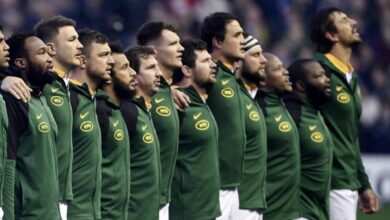Story of South Africa Rugby 2024 WRAPPED: A year Where Boks, and Rassie, Led the Way
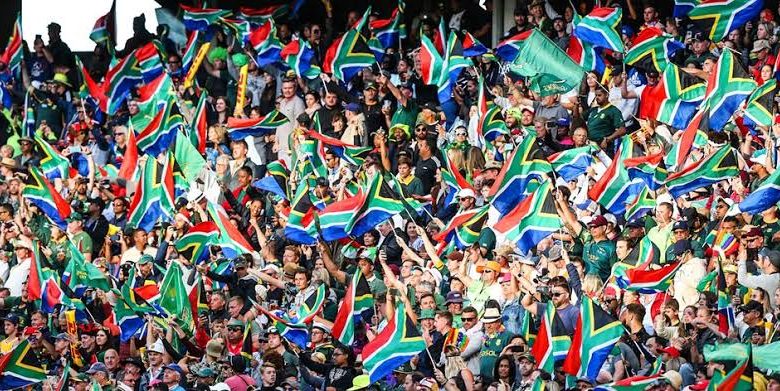
THE STORY OF SOUTH AFRICAN RUGBY IN 2024
This was arguably the first post-World Cup winning year where it could be reasonably said that South Africa backed up the status of being global winners by leading the rest of the field.
It might have happened in 2020, but remember, that was the Covid year – when there was very little rugby in the country and the Springboks did not play. In 1996 and 2008 there was a step backwards before going forward following the respective 1995 and 2007 wins, but not in 2024, with the Boks losing their No1 World Ranking for a short while to Ireland but then claiming it back during the course of the November tour.
They lost just twice, with the defeat by a solitary point, courtesy of a last gasp Ireland drop-goal, in the third match of the year in Durban being followed later by an unexpected reverse to Argentina in Santiago. Sure enough though, the Boks buried the memory of that defeat with a thumping win over the Los Pumas in Nelspruit the following week, arguably their best performance of the year.
While the Bok win at the World Cup in France was not universally popular globally, by the end of 2024 it was becoming apparent that grudging respect was transitioning into an acknowledgement that South African rugby, and what has made it successful, is something the rest can learn from.
While Bok coach Rassie Erasmus was laughably overlooked for the World Rugby Coach of the Year award, there is no denying his standing as an innovator and leader in a constantly evolving sport
RASSIE WASN’T ONLY SUCCESSFUL SA COACH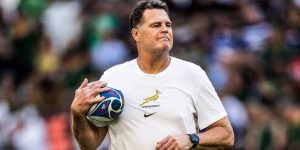
Not that he’s the only SA coach who has achieved in the past 12 months – former Bok centre and national assistant coach Franco Smith won the Vodacom United Rugby Championship with Glasgow Warriors, while former Sharks coach Sean Everitt was credited with the improvements made by the other Scottish team, Edinburgh.
Johann van Graan, who had moved from Munster to Bath, came within an ace of winning the Gallagher Premiership, with his team losing a closely fought red card impacted final against Northampton Saints.
Given the standing the rugby has within SA as a unifier and driving force for national growth, what was a little disappointing was the fact that the Boks had sole grip of the baton. The Hollywoodbets Sharks did win the EPCR Challenge Cup, but then they should have given how mediocre most of the teams in that competition are and the star studded quality of the Sharks’ team sheet.
The Vodacom Bulls were the best team in the URC, taking over from the inaugural champions and two time finalists, the DHL Stormers, but could not close the deal in the decider against Smith’s Warriors after they had set it up so well for themselves by beating mighty Leinster in the semi-final.
The Blizboks won bronze at the Paris Olympics, which was an achievement given how far they’d slipped in the World Sevens Series, and they had to fight just hard to qualify to compete in the Olympics. The Junior Springboks continue to under-perform at the World Junior Championship, which is startling given the huge well of young talent that there is available and which stands out at school level and then quickly graduates to senior rugby.
Fortunately positive progress with changes of coach at both Blitzbok and Junior Springbok level is happening and we should expect a better return from both going forward.
LONG SEASON A STUMBLING BLOCK
The creation of depth at Bok level thanks to Erasmus’ selection policy has been well documented, and is arguably the biggest coup of the year for SA rugby, but the biggest stumbling block to sustained success may well be what also makes SA strong – the commitment to a southern hemisphere international competition in the form of the Castle Lager Rugby Championship while the franchises are aligned to a northern hemisphere club competition.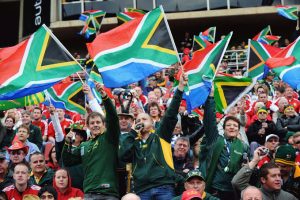
This means there is no break in the rugby year, and the decision to play the Carling Currie Cup during the window that should have been the off-season for SA’s provincial/franchise players was rightly challenged by player representatives and hopefully won’t be repeated going forward. It led to the ridiculous situation of the Sharks winning the Currie Cup in what was effectively the pre-season phase, something that may have cost them on their first URC tour.
BOKS ON TOP OF THE WORLD
The remarkable achievement for the Boks was the way they managed to win while also both evolving their game and creating depth with a selection policy that any other nation, with fewer players to choose from, would have regarded as highly risky. The Boks ended the year having lost just two games, but with a bit of luck it could have been an unbeaten year – they went understrength in their loss to Argentina, and they were a bit between game strategies when they lost to a late drop goal after coming back strongly in the Kings Park Test against Ireland.
Only drawing that series against the team that jostled them for the No1 position later in the season was undeniably the disappointment of an otherwise triumphant year. It gave the Irish some bragging rights and, for a while, false pretensions until New Zealand put that right by winning at the AVIVA Stadium last month
WINNING CHAMPIONSHIP THE CROWNING GLORY
The winning of the Rugby Championship for only the second time in its current guise, and for the first time when the competition was played to a full format (the win in 2019 was in truncated competition because it was a World Cup year) was the crowning achievement of Siya Kolisi and his Boks.
They took the competition by the scruff by comfortably winning their two games in Australia, and with understrength teams in both games to boot. They then went on to beat the All Blacks twice, thus making it four wins in a row against the Kiwis for the first time since Okey Geffin’s boot contributed to a 4-0 whitewash in 1949, but you could argue that in neither game were the Boks completely at their best.
Indeed, you could say that about most of their games. The need to evolve, that was rightly recognised by Erasmus in the wake of the World Cup win in France, led to the recruitment of former All Black flyhalf and renowned attack guru Tony Brown as an assistant coach. That led to understandable growing pains and contributed to the feeling after most games that the Boks could have won by more than they did.
SACHA WAS BREAKTHROUGH PLAYER
That is the real positive from the year – the fact that it feels the Boks can only get better. And there are prodigiously talented players who will only grow, such as Sacha Feinberg-Mngomezulu, who showed maturity and composure beyond his years in his first taste of international rugby.
His massive penalty from well inside his own half helped keep the Boks afloat in the Johannesburg game when the Kiwis were well on top and, looking back, it was a big contributor to their comeback win in that game.
Feinberg-Mngomezulu, who kicked a long range penalty with his first touch of the ball when coming on as a replacement in the first game of the year against Wales in London, is much more than just a reliable place-kicker with a distance to the kick that matches the legendary Frans Steyn, but is a precocious and unpredictable attacker too.
Not that Feinberg-Mngomezulu was alone in being a breakout star for the Boks, and Aphelele Fassi, Ruan Nortje, Elrigh Louw, Gerhard Steenekamp, BJ Dixon and others all got opportunities and made their mark.
NELSPRUIT WAS PERFORMANCE OF THE YEAR
The performance of the year was the one in Nelspruit, when the Los Pumas were swept away by a green and gold tidal wave and Manie Libbok, thriving on a strong forward platform, dazzled the opposing defence with his passing game.
The down moments of the year would have been a tie between the same Libbok’s miss in Santiago when he had an opportunity to win it, and the drop goal in Durban that grabbed Ireland a share of the spoils.
Feinberg-Mngomezulu would be my breakthrough player, but Fassi was the player who emerged from the fringes to properly establish himself as a first choice. At least until Damian Willemse returns from injury – this country does have such enviable depth.
OVERVIEW OF THE 23/25 VODACOM UNITED CHAMPIONSHIP
The Vodacom United Rugby Championship has had three editions – and in all three the final has been played in South Africa. This time it wasn’t the Stormers’ home ground of DHL Stadium in Cape Town that hosted, as it had in the first two years, but Loftus.
The Vodacom Bulls, after a very successful rebuild and astute off-season business from their director of rugby Jake White, were the standout local team, always way in front of the others, and secured a home final when they upstaged Leinster on the semi-final weekend and Glasgow Warriors did the same to Munster.
The Bulls, Munster, Leinster and Glasgow had been involved in an absorbing and thrilling four way tussle for the top spot in the league, and Munster eventually prevailing by a narrow margin. But the URC has yet to see a top of the log finisher actually win the competition, and Glasgow, by shocking the Bulls in the Loftus final, ensured that this was a year where the fourth placed finisher eventually held the trophy aloft.
BULLS MADE CRUCIAL BUYS
The Bulls’ improvement was based around the impact made by some crucial buys, most notably tighthead prop Wilco Louw and fullback Willie le Roux, with the Bulls advancing to the final by making a complete shambles of the highly rated Leinster scrum.
The Stormers fell away a bit from the previous years’ achievements chiefly because they started poorly. After two comfortable home wins they headed overseas on a four match tour – and lost every game. That was going to take some recovery, and it was to the Stormers’ credit that but for an unexpected home defeat to Ospreys in April, a team that the Stormers had clearly underestimated, they might still have crept into the top four.
As it was, they finished fifth, and found that winning playoff games on the road is much harder than at home. Glasgow beat them with something to spare at the Scotstoun.
CLOSE MISS FOR IMPROVING LIONS
It was a nearly nearly year for the rapidly improving Emirates Lions. The Johannesburg team was in contention for a top eight finish, and Investec Champions Cup qualification, until their last game of the season.
When they picked up two bonus points in their defeat to the Stormers in a pulsating game at the DHL Stadium, they actually moved into the top eight and had reason to celebrate – only for the Ospreys to sneak in by getting full points in the last game of the league phase.
SHARKS WERE THE DISAPPOINTMENT
The big disappointment was the Sharks. Under a new coach in John Plumtree, the Sharks started poorly on their overseas tour, when they were understrength, and never recovered. They were unlucky in some games, with the one to Connacht a standout in the memory, but generally it was quite apparent that Plumtree was on the money when right at the start he said the team culture was one of the areas that required most work.
The growth of that aspect was most apparent when they hung in to win the semi-final of another competition, the EPCR Challenge Cup, in London. But by then Plumtree had made it clear the European knock-out competition had become his focus, and the Sharks’ URC season ended as lamely as it had started.
INVESTEC CHAMPIONS CUP REVIEW
They did not get beyond the round of 16 but it was arguably the Stormers who broke most ground of the SA teams in the Champions Cup with their close win over the then two times reigning champions, La Rochelle, in Cape Town. They then went on to push the same opponents all the way in the round of 16 game, and would have won had Manie Libbok slotted a last gasp conversion attempt.
That game, even though the Stormers lost, did prove that local teams can compete with the best – although Stormers director of rugby John Dobson, and his Bulls counterpart Jake White, would be the first to agree that winning really big games away in Europe is an uncrossed frontier.
The Bulls did make the quarterfinal for the first time, where they lost to Northampton Saints at Franklin Gardens in a game that was preceded by controversy as the UK media, showing they had no semblance of a memory or levity as it happens all the time in the competition, accused the Bulls of disrespecting the competition by sending an understrength team.
It was unavoidable though, for the South African teams do face a massive obstacle in the way travel for Champions Cup and URC fixtures dovetails, or doesn’t, to leave them with might logistical challenges. If White had gone to Northampton with a full strength team, it would have compromised the Bulls’ URC challenge.
SHARKS WIN WAS BIG MOMENT
The big South African moment in Europe was the Sharks winning the EPCR Challenge Cup by beating Gloucester in the final. The Challenge Cup is way below the Champions Cup or obviously the URC in prestige, as it is essentially a competition competed for by the also-rans in the bread and butter league competitions, but it did give the Sharks their entrance into this season’s Champions Cup.
They had to hold their nerve in the semi-final against Clermont-Auvergne, with new flyhalf Siya Masuku kicking a clutch conversion from the touchline to win the game.


